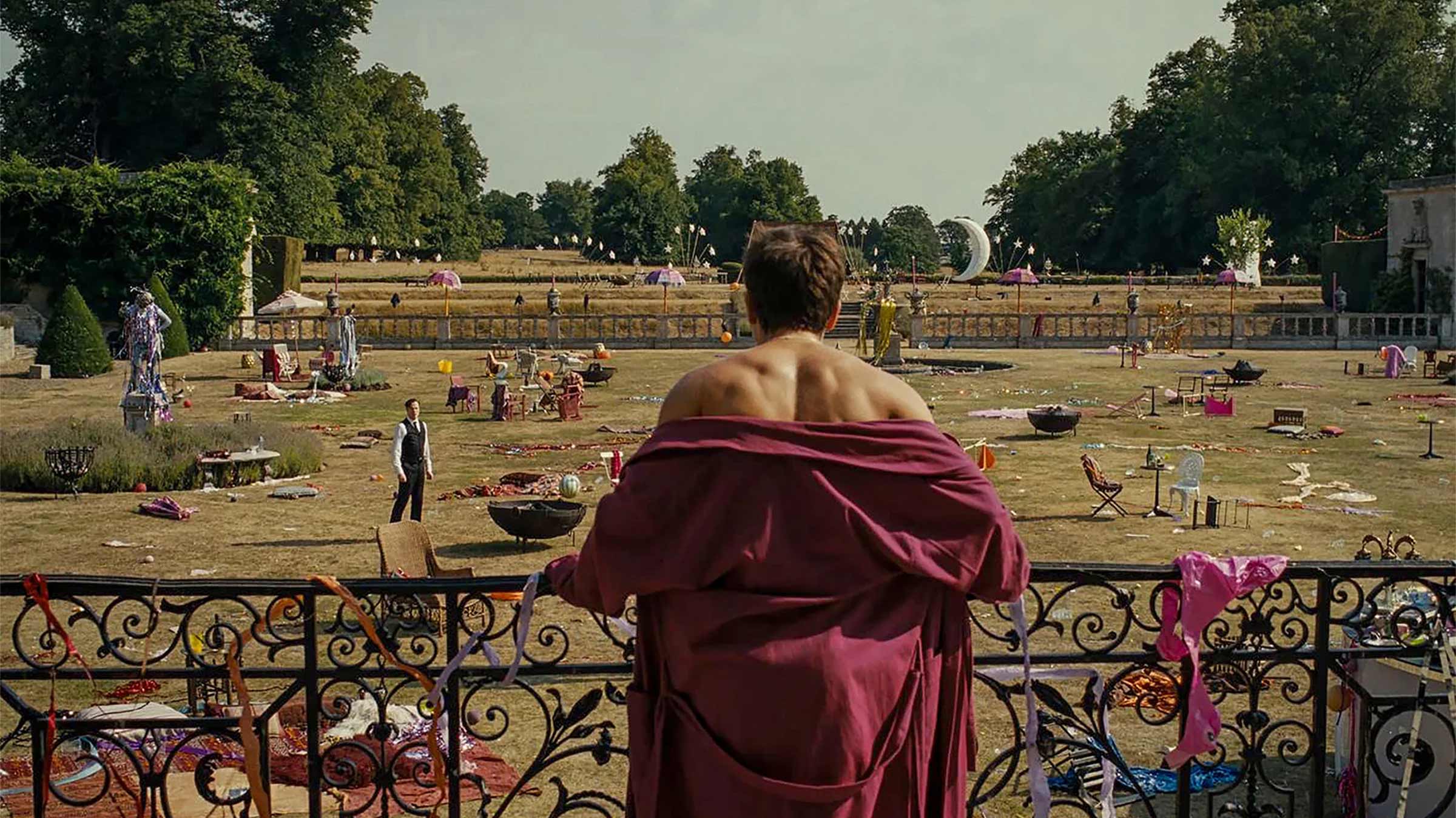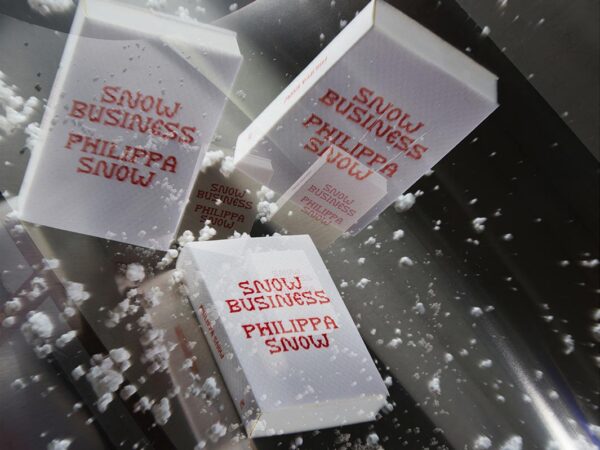In a web of cinephilic homages, Emerald Fennell’s sophomore feature spins a half-baked tale of lust and ambition
This piece contains spoilers.
What if The Talented Mr. Ripley went to Oxford? Multihyphenate Emerald Fennell could’ve scrawled this idea on a napkin before her Best Screenplay Oscar (for Promising Young Woman) was even engraved, and studios would’ve greenlit the project within an hour. Upon the release of Saltburn—Fennell’s sophomore feature about poor student Oliver Quick (Barry Keoghan) who gets whisked away to the English countryside by his rich classmate—this hunch has proven itself well-founded. The combination of sumptuous cinematography and dynamic lead performances delivers with respect to the film’s Ripley conceit, but it ultimately falls into the same reductive third-act trap Fennell encountered with Promising Young Woman.
“I wasn’t in love with him. But did I love him?” a suit-clad Oliver muses. It’s an address reminiscent of Salieri’s asylum confession in Amadeus, with shades of loving, loathing, and the semi-veiled promise that someone is dead. The film then cuts to Oliver’s first day at Oxford in 2006. Tracking the protagonist as he walks through hordes of students, we too are starry-eyed—not at Oxford itself, but at the idea of it, the beguiling shine of richesse and well-connected friendship that an elite education can offer. This fantasy is real for those already in the milieu—not losers from an impoverished background and unstable family like Oliver. Aware of this imbalance, he sets his sights on Felix Catton (a disgustingly charming Jacob Elordi), who exists at the center of this promised orbit.
From the moment he enters the frame, Oliver is not to be trusted—Keoghan deftly avoids the cloying nerdiness of Matt Damon’s Tom Ripley, imbuing the character with more of the chilling determination of Andrew Cunanan. Oliver and Felix party their way into an intensely homoerotic boyish friendship. When the former’s father tragically dies, it’s only right that Felix invite him to his family’s sprawling country estate, Saltburn, where he is greeted by the Haves and the Have-Not hangers-on: Elsbeth and Sir Catton (Rosamund Pike and Richard E. Grant), sister Venetia (Alison Oliver), suspicious cousin Farleigh (Archie Madekwe), and Pamela (a hilarious but briefly-seen Carey Mulligan). “I have a complete and utter horror of ugliness,” Elsbeth tells Oliver, and on the surface, that’s true: Theirs is a summer of playing tennis in tuxedos, reading Harry Potter by the moat, and dressing up for dinner. (“It’s like black tie,” Felix vocal-fries on the first night.) What ensues is weeks of sexually-charged debauchery against the backdrop of mid-noughties indie sleaze.
“The ensuing lunch scene in a dark-red dining room leans fully into the absurdity of the Cattons’ rich stature, unwilling to look at ugliness even as it’s wheeled out in a body bag just beyond the curtains.”
At first fulfilling his role as a summer plaything, Oliver quickly begins to use guests’ suspicions of one another for his own gain. He willingly molds himself into whatever Saltburn’s residents need at any given moment, handily seducing both Venetia and Farleigh in some of the more surprising sex scenes on film this year. “I’m a vampire,” he says to Venetia before tasting her period blood. In one of the tenser scenes, Oliver flirts with Elsbeth, then tells her Pamela’s stories of domestic abuse weren’t adding up, which she readily buys. It’s shape-shifting, reminiscent of Terence Stamp in Pier Paolo Pasolini’s Teorema, that propels the Saltburn story. Through halls lined with priceless artworks Felix casually writes off as “bad Rubens” (a reference to the work of Peter Paul Rubens), Oliver spins his web, pitting everyone against each other—yet he can only circle around the one he really wants: Felix.
In a brilliant flourish, Fennell writes Oliver’s dad as Chekhov’s gun. Felix takes Oliver home for his birthday against his will, to find that his father is not only alive, but also charmingly well-adjusted. Oliver has solely suffered from the gap between the idea of himself and middle-class mediocrity. The film then picks up steam, speeding from the dissolution of Felix and Oliver’s friendship to Oliver’s birthday party—apparently the final night at Saltburn. Keoghan dons a pair of antlers, calling back to The Killing of a Sacred Deer. Felix is found dead the next morning, still wearing a pair of gold Loewe-esque angel wings. The ensuing lunch scene in a dark-red dining room leans fully into the absurdity of the Cattons’ rich stature, unwilling to look at ugliness even as it’s wheeled out in a body bag just beyond the curtains.
Fennell’s willingness to see Oliver’s sexual urges through to the furthest extent possible paves the way for the film’s most memorable scene. After Felix’s funeral, Oliver returns to the fresh grave where he cries, disrobes, then begins to have sex with the dirt. Keoghan commits physically; he oscillates between moans of sadness and pleasure, pulling earth toward him as a hand reaches toward the wooden cross at the head of the grave. The wide-shot never shifts. We must watch Oliver take Felix—the one thing he couldn’t have—when he can no longer give himself over. It’s unfulfilled desire made all the more filthy by the dirt.
The third act of Saltburn both boils over and loses its candy-coated shell. Fennell—who similarly fumbled at this point in Promising Young Woman—remains beholden to the “murderous gay man” canon. Where she could have allowed the frenetic tension of Oliver’s lust and deceit to propel him toward what he ultimately wants—everything for himself, with every complicated emotion that comes with it—his quest is entirely reduced to one motivation: hate. “I hated him. I hated all of you,” Oliver monologues as it’s revealed he was the one to kill Felix and Venetia and oust Farleigh; and we are left unsurprised. In this moment, Fennell reveals her process in a way that feels cheap: Oliver’s motivations are reduced to his attraction to Felix and inability to have him. For a performance that had been so electric and unpredictable, ricocheting between fame monster and scared little boy, Keoghan’s line delivery rings hollow. It’s a missed opportunity, not allowing Oliver to become the “patron saint of the mediocrities” à la Salieri, dancing through the halls of Saltburn amidst the spoils.



















